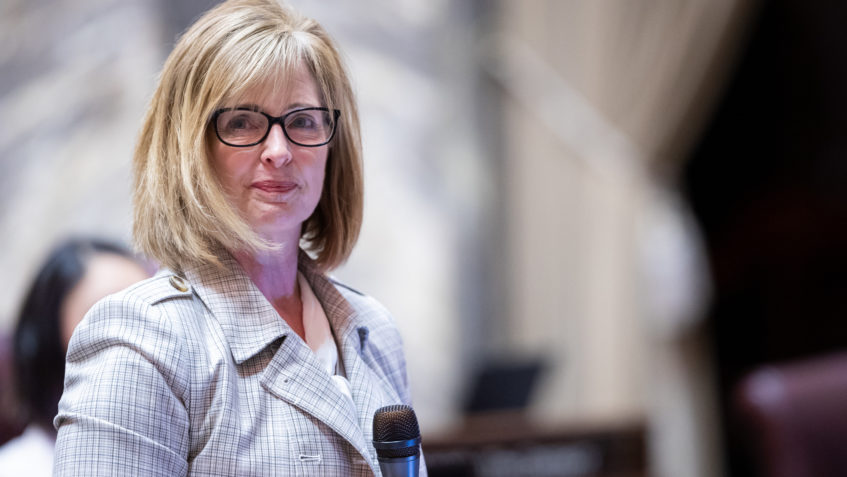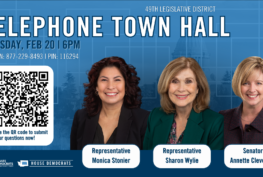Dear neighbors,
Although the legislative sessions in even-numbered years are shorter than the odd-year sessions dominated by the passage of biennial budgets, this year’s session felt more like a long session. As chair of the Senate Health & Long Term Care Committee, I oversaw no fewer than 45 healthcare-related bills that the Senate and House sent to the governor to be signed into law. I was the prime sponsor of several of these bills, as well as the sponsor of several others that passed in the form of House companion legislation, but all 45 were heard and passed by my committee en route to full passage by the Legislature.
So what will these new laws mean for households in Washington? The quick answer is that the laws improve protections for consumers, reduce healthcare costs in a range of areas, expand the healthcare workforce, and make behavioral health treatment more available to young people.
Many of the bills reflect continued, overarching efforts such as:
- Improving healthcare access, coverage, affordability and quality;
- Continuing the research and preparation to pave the way for universal healthcare coverage, including enhancing our state public option health care coverage; and
- Making the most of state subsidies to buttress healthcare delivery and patient access.
Meanwhile, we prioritized three areas of need:
- Our state and national mental health crisis;
- Reproductive health; and
- Workforce shortages in numerous areas of healthcare.
That’s the big picture. For more detail, I’ve highlighted key bills below for each area of need. Measures marked with asterisks identify Senate bills that I prime-sponsored or legislation I prime-sponsored in the Senate that passed in the form of a House companion bill.
Mental Health, Substance Use Disorder, and Opioid Treatment
- SB 5853 will expand on the state’s successful system of behavioral health crisis relief centers for adults only by providing comparable facilities for minors.
- SB 6228 will remove barriers to treatment for substance use disorders, increasing inpatient treatment, capping certification fees, and cutting red tape.
- SB 6251 will require regionalized, coordinated behavioral health crisis response plans across our state.
- HB 2247 will ease behavioral health provider shortages by making numerous changes to requirements for licensing, practice settings, and reimbursement in various behavioral health professions.
- HB 2396 calls for public outreach campaigns on the dangers of fentanyl and other synthetic opioids, and requires jails to provide information on substance use disorder treatment programs to people upon their release.
Reproductive Health
- SB 6151 will prohibit unlicensed or unsupervised people from performing ultrasounds.
- HB 1954 will prohibit professional disciplinary action against a healthcare worker who provides reproductive care that is legal in Washington state.
- HB 2115 will protect a prescriber of abortion medication from harassment or worse by allowing the substitution of a health care facility name in place of the prescriber’s name on a prescription label.
Workforce Shortage
- HB 5184 will ease a critical workforce shortage by establishing the profession of anesthesiologist assistant in Washington state.
- HB 5811 will expand certification requirements for individual long-term care providers serving only their child or parent by removing the limitations that the care recipient be the biological, step, or adoptive child or parent.
- SB 5940 will allow hospitals in rural areas to maintain full staffing levels by hiring highly trained, volunteer emergency medical technicians to provide medical care under the supervision of a medical practitioner.
- SB 6286 will increase the availability of nurse anesthetists by directing the Washington State Board of Nursing to develop and manage a preceptorship program.
- HB 1917 will increase access to healthcare by establishing agreements between certain states to allow licensed physician assistants to practice across state lines.
- HB 1939 will establish agreements between certain states to allow licensed social workers to practice across state lines.
- HB 2041 will allow better collaboration between physician assistants and the physicians with whom they work.
- HB 2355 will allow magnetic resonance imaging technologists to be certified as radiologic technologists.
Access to Care
- SB 5821* will expand access to care by allowing out-of-state healthcare providers to give Washington residents telemedicine services that satisfy Washington’s existing standards for medical care.
- SB 5920 will reinstate the authority of the Department of Health to grant certificate-of-need exemptions for adding new psychiatric beds to a hospital, changing the use of beds to increase the number of psychiatric beds, or constructing a new psychiatric hospital.
- SB 6127 will increase access to PEP, which can prevent infection if taken immediately after potential HIV exposure, by requiring insurance cover the medication at no charge to the patient and mandating that hospitals dispense the medication when needed in emergency settings.
- SB 5983 will enable public health organizations to better combat sexually transmitted infections by expanding the ability of medical assistants with telehealth supervision to treat syphilis infections.
- SB 6095 will expand the ability of the Secretary of the Department of Health to issue standing orders from emergency situations to help local public health control and prevent the spread of a disease or threat to public health.
- HB 1941 will recognize special needs by offering health home services for Medicaid-eligible children with medically complex conditions.
- HB 2015 will accelerate the inspection schedule for adult family homes seeking to increase bed capacity to seven or eight beds.
- HB 2075 will eliminate red tape by streamlining the state licensing of Tribal health care providers that already meet federal licensing standards.
- HB 2295* authorizes hospitals in Washington state to continue to offer certain hospital at-home options for appropriate patients past the scheduled expiration of a federal program launched during the pandemic.
Coverage
- HB 1957 will update state laws on preventive services, providing certainty for carriers and consumers.
Affordability
- SB 5986* will ensure the continuation of timely ambulance response while also protecting Washingtonians from being billed for emergency ambulance service beyond the costs charged by their health plans.
- HB 1508 will improve consumer affordability by enabling the state’s healthcare cost transparency board to better track rises in healthcare costs.
- HB 1979 will lower users’ costs by requiring health plans to cap the total out-of-pocket cost for a 30-day supply of inhalers and epinephrine autoinjectors.
Though they don’t fit neatly into any of the above categories, two other healthcare bills of mine were passed into law – SB 5271, which will strengthen enforcement tools to protect patients in facilities regulated by the Department of Health, and SB 5982, which will update the state’s legal definition of “vaccine” to include all federal food and drug administration-approved immunizations recommended by the Centers for Disease Control and Prevention.
As you can see, we worked hard to continue to find ways to improve access to healthcare while also keeping costs down – and we’ll keep searching for even more ways to improve healthcare in the months and future legislative sessions to come.
All my best,
![]()




